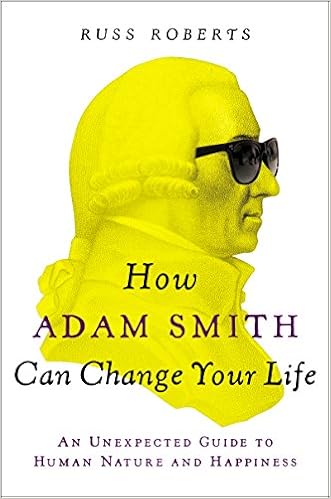 First, an apologia. I haven’t
completed reading Adam Smith’s The Theory
of the Moral Sentiments. I’m reminded of this when I log into goodreads and it inquires about how I’m
progressing. (It’s annoying. "I know, I know.") Right now, it’s on the
backburner. But it’s not there because it’s not worthwhile (it is), nor because
it’s poorly written (it’s not), but because, as Roberts mentions, it’s written
in 18th century prose that—for all its beauty—can prove challenging to
those of us living in the Age of Twitter.
First, an apologia. I haven’t
completed reading Adam Smith’s The Theory
of the Moral Sentiments. I’m reminded of this when I log into goodreads and it inquires about how I’m
progressing. (It’s annoying. "I know, I know.") Right now, it’s on the
backburner. But it’s not there because it’s not worthwhile (it is), nor because
it’s poorly written (it’s not), but because, as Roberts mentions, it’s written
in 18th century prose that—for all its beauty—can prove challenging to
those of us living in the Age of Twitter. In addition to all of that, Smith’s Theory of the Moral Sentiments is only one of many of the Great Books that I haven’t completed. I read a lot, but sometimes it seems like climbing an endless mountain. One must cast aside so many worthy candidates to delve into one. If I’m reading The Theory of the Moral Sentiments, I’m not reading Smith’s more famous An Inquiry into the Nature and Causes of the Wealth of Nations.
All of this brings me to an important point: secondary works, commentaries that riff off the original, provide a
valuable service when we can’t manage a complete St. John’s-style—original
texts only—reading diet. Is reading a commentary as good as delving into the
original? No. But it’s better than no exposure at all. It reminds me of going
to the Uffizi Gallery in Florence this summer. I did the audio tour, skipping
careful examination of many great works, but with limited time—the ultimate scarce
resource—it was the way to go. Thus, with secondary works (more than Cliff
Notes, of course) you can follow someone like Roberts as he explores Smith’s
work. The quality of the guide can vary. But it’s clear that Roberts
has put in the time to qualify as our docent.
So why Adam Smith’s Theory of the Moral Sentiments and why
via Russ Roberts? First, Smith.
 |
| Smith without sunglasses, not in profile |
| Russ Roberts, The EconTalker |
As to the book itself, it’s a
reflection on Smith’s insights into human nature and sociability. Roberts puts
Smith’s insights into contemporary contexts and idioms. Smith, despite his
bachelor life, developed some terrific insights into how society worked, how people
work (their sentiments, emotions), and how people interact. In fact, along with
his friend Hume and other members of the Scottish Enlightenment, Smith helped
develop theories of sociability and morality that deserve greater consideration.
(For the influence of the Scottish Enlightenment on Jefferson’s Declaration of
Independence, read Garry Wills’s Inventing
America. These Scots, more than Locke, provided the intellectual foundations of Jefferson’s thought.) Smith was not an ideologue of individualism—far from
it. Instead, he always located the individual within his or her interactions
with others. Roberts explores these themes, teasing out their contemporary manifestations
and applications. It’s a well-written, entertaining, and enlightening introduction
to this neglected aspect of Smith’s work.
My guilt at not having read Moral Sentiments is assuaged by the fact
that Roberts, well into a career as an econ professor, admits to having read
the work only relatively recently. And now with his book, Roberts has helped
take a bit more of my sting of shame away.
Postscript: I listened to this
book instead of having read it. It was on my reading list (such a long list and
still growing!), but serendipity struck by way of a sale offer on Audible. Listening works well for this book,
but I have to say that despite the fine reading, I was disappointed not to have
Roberts reading it. After having listened to so many of his podcasts, and with
his relaxed manner—not as folksy as Garrison Keillor—but still with an inviting
air, it would have been good to have Roberts read it. But as it was, I simply
substituted his voice in my head as I listened.
*For a fun example of Roberts’s fairness,
watch the brilliant
videos of Keynes and Hayek that (among other things) poke fun at the perpetual
sense of inferiority that Hayek and Hayekians feel about Keynes, Hayek’s Nobel
notwithstanding.
(That is what’s going on, right?)